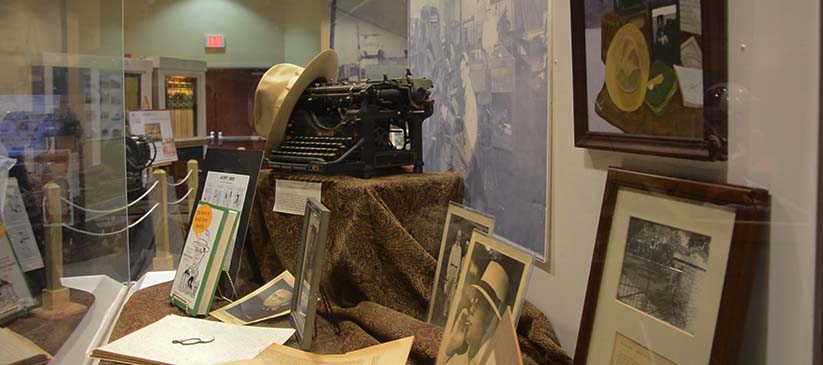
Robert Quillen was an American journalist and humorist who for more than a quarter century was “one of the leading purveyors of village nostalgia” from his home in Fountain Inn, South Carolina. Quillen was born in Syracuse, Kansas, near the Colorado border, in 1887. He was raised in Overbrook, Kansas where his father published the local newspaper. As a youngster, he learned to set type and as a teenager sold pen-and-ink drawings and published a monthly magazine.
In 1904, shortly before his seventeenth birthday, Quillen joined the U.S. Army under an assumed name (swearing he was 21), but by mid-1905, he had been released from military service. He then spent a few months working for newspapers in the northeastern United States where he had been discharged. In 1906, he answered an ad seeking an editor for a weekly that a publisher hoped to establish in Fountain Inn. He remained in Fountain Inn only three months, but during that time met and married a local woman, Donnie Cox, who was five years his senior. He moved to Americus, Georgia, and then took his new bride to Washington State, where he joined forces with his father and worked at publishing newspapers and magazines.
In 1910, when his brother-in-law in Fountain Inn offered to sell him a weekly advertising sheet called News and Notions, Quillen bought it and borrowed money to purchase his own press and type. In the following year he began editing and publishing the Fountain Inn Tribune, “a well organized publication overflowing with news from Fountain Inn and outlying communities.” With fewer than a thousand subscribers, the newspaper itself was probably never profitable, but Quillen used the ideas generated in Fountain Inn as the basis for pieces that appeared in scores of leading national magazines and newspapers. Twice, frustrated with the time it took to run the weekly, he sold the paper (notoriously in 1926 for one dollar) and twice bought it back. In 1929, Quillen called the Tribune “my hobby – my substitute for gold.”
By 1932 his work, which included editorials, paragraphs, cartoons, and one-lines, was regularly appearing in four hundred newspapers in the United States, Canada, England, and the Far East. With the assistance of Chicago newspaper executive Eugene P. Conley, Quillen also syndicated two single-panel cartoons (drawn by John H. Striebel), “Aunt Het” and “Willie Willis” – the latter of which was translated into Dutch as “Pimmie Pimmel.”
As early as 1924, Quillen’s income from the syndicated material alone was probably more than $25,000 – easily ten times that amount in early 21st century dollars. In 1934 Hollywood screen writer Lamar Trotti and producer George Marshall visited Quillen to use him as the prototype for a Will Rogers film, Life Begins at 40, in which Rogers played a small-town newspaper editor. The film credits mentioned Quillen for “contributing dialogue.” Unable to have children of their own, Quillen and his wife adopted a baby girl, Louise, to whom Quillen later wrote a noted series of public epistles, “Letters from a Bald-Headed Dad to His Red-Headed Daughter.” Shortly after the adoption, his wife died following routine surgery. On December 24, 1922, Quillen married another woman from Fountain Inn, Marcelle Babb, whom he had known from childhood.
Robert Quillen died in a nursing home in the mountains of North Carolina in 1948 and was buried in Fountain Inn. Quillen was inducted into the South Carolina Press Association Hall of Fame in 2009 and the South Carolina Academy of Authors in 2014.